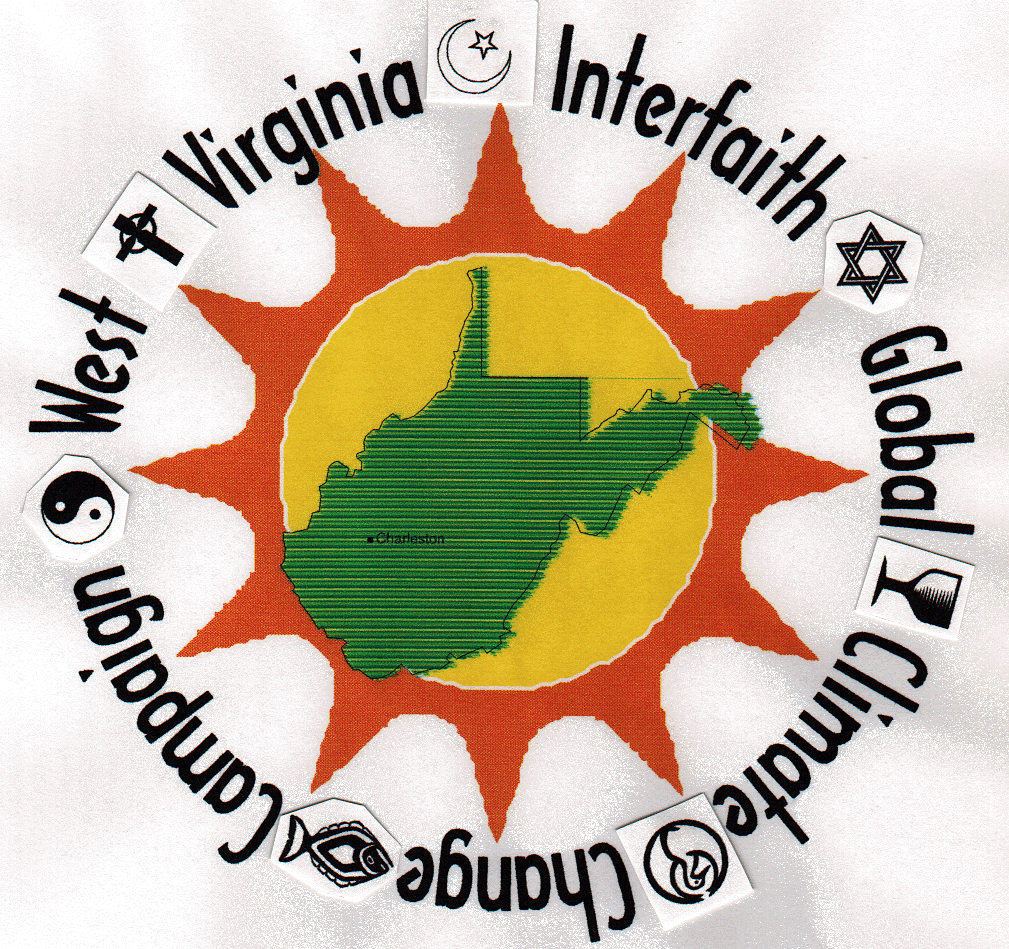
INTERFAITH GLOBAL CLIMATE CHANGE CAMPAIGNS
WEST VIRGINIA
Coordinator: Marcia Leitch
P.O. Box 226
Talcott, WV 24981-0226
home: 304-466-0982
fax: 304-466-4790
email: jmleitch@mountain.net
Five-Year Goals
Goals for characteristics of the world
Goals for characteristics of the faith community
Goals for characteristics of the WV Interfaith Global Climate Change Campaign
Tasks of the WV Interfaith Global Climate Change Campaign
Five-Year Goals
In THE FUTURE, OUR goals for the world are:
- Global awareness and appreciation of one another.
- Global citizenship, harmony, and responsibility.
- Equal "eco-footprints" (the "mark" we leave on the Earth).
- Sustainable, equitable use of world resources and living habits.
- Being aware and knowledgeable of energy consumption.
- See "progress" as different than GNP.
- Promoting opportunities for dialogue, such as Partnership of Religion, Temple of Understanding.
- International system of justice
- Natural capitalism — a new look at policies, subsidies, land distribution, local consumption, reuse, recycle.
- Non-violent, non- prejudice.
- Non-isolationist US policy.
Goals for characteristics of the faith community
In five years, realistic goals for the faith community are:
- Progress towards tolerance and understanding among religious groups, looking for our commonalities and rediscovering our "roots" (basic faith teachings)
- Incorporating our concerns for the environment into our liturgies, worship, education, and programs.
- Affirming in thought and action the interconnectedness of all of life.
- Congregations, homes, businesses, and government agencies will be conserving energy and stating, "We have a right to renewable energy."
- Our ethics and responsibilities will promote "small is beautiful" and critically analyze technology and our own consumption habits.
- Work with allies in the secular organizations, partnering with them on common concerns.
Goals for characteristics of the WV Interfaith Global Climate Change Campaign
In five years, realistic goals for the campaign are:
- Strong alliance with the environmental ministries of faith groups.
- Strong partnership with environmental, political reform, and social justice organizations.
- Religious decision-makers will be sitting around our table.
- Strong grassroots groups at local/county level.
- Pool of technical assistance.
- Developmental issues informed by climate change issues, such as disaster relief.
- Strong reputation with established credibility and advise.
- Strong media program.
- Strong volunteer capacity including senior citizens and youth.
- Strategic events with strong spread effect and increase base.
- 50% of funding for campaign from faith groups.
- Strong educational voice on public policy — "WV Center for Public Policy."
- Analyze corporate and manufacturing waste in the state.
- Members of campaign representatives serving in faith group structures.
Tasks of the WV Interfaith Global Climate Change Campaign
In five years, realistic tasks for the campaign are:
- Develop relations with media, elected officials and their staff.
- Develop coalition with environmental, social justice, and political reform organizations.
- Representation on the WVCC’s Disaster Recovery Task Force and Governor’s Task Force.
- Recruit for steering committee and grassroots.
- Intern program with graduate students on waste/reuse/emissions projects; include campus ministry programs in our outreach to colleges and universities.
- Keep website updated.
- Develop a brochure and calling cards.
- Develop a futuristic blueprint for such counties as McDowell, Boone, and Wyoming, to serve as model communities.
- Develop county strategies.
- Develop relations with faith groups.
- Tour of sustainable housing and businesses.
Congregational/Faith Communion Education
1. Forty (40) congregations using climate change related resources, such as scripture study, the video, "God’s Creation and Global Warming," bulletin insert, faith group statements, and Energy Stewardship Congregation material, with eight of these being people of color congregations/faith communions.
2. One (1) Senior High Environmental Interfaith Summer Adventure for 30 young people in West Virginia representing 10-12 faith communities.
3. Twenty (20) presentations, services, or workshops on the climate change campaign to faith groups, and civic or environmental organizations, including youth groups.
4. Ten (10) climate change campaign displays at organizational and faith group events, including youth groups.
Resource Assessment Teams
5. Two (2) regional teams of volunteers, who provide assessment of buildings and grounds for religious and non-profit organizations will be trained and receive technical support.
6. Three assessments will be conducted by each regional team.
Energy Stewardship
7. Eight (8) presentations at congregations, faith communion gatherings, annual conferences, and environmental organizations on technologies available for energy conservation (electric, gas, auto fuel efficiency) and alternative energy.
8. Twenty (20) congregations/non-profit organizations will participate in the CFL project.
9.Twenty (20) congregations/businesses/organizations and one hundred family units will pledge to reduce their energy consumption by 20%.
Partnering with other Non-profit, Environmental Organizations, and other Sectors
10. One (1) information gathering and research campaign targeting the state's large energy consumers, which would lead to activities such as partnering, dialogue, meetings, writing letters, media coverage and/or one building to be redeveloped as a model of energy efficiency.
11. One (1) action plan developed, for identifying the sectors (such as business, labor, education) of the state for the support of just energy use and sustainable livelihood in transitioning to sustainable energy use and renewable energy industries.
12. Five events sponsored jointly with coalition groups of similar goals.
Media Education
13. Twenty (20) articles or op-eds appearing in public, faith-based, or organizational newspapers/ newsletters.
14. Four (4) radio interviews or stories related to the campaign.
15. Five (5) television station broadcast interviews or coverage of campaign related news and events.
16. One (1) media training event for the steering committee members, others involved in the campaign, and representatives of partner organizations, to strengthen skills in conveying our message through the media.
Pubic Policy Advocacy
17. Ten (10) meetings with elected officials (national, state, local) about issues related to the campaign, especially legislation about energy, fuel economy, and binding international agreements.
18. Forty (40) letters to elected officials related to climate change issues.
Return to West Virginia Home Page